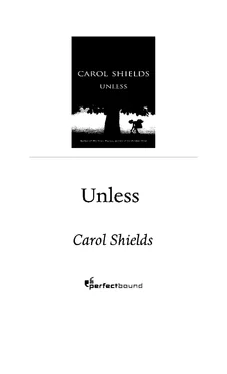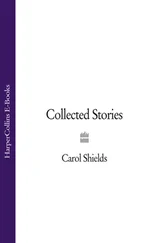Carol Shields - Unless
Здесь есть возможность читать онлайн «Carol Shields - Unless» — ознакомительный отрывок электронной книги совершенно бесплатно, а после прочтения отрывка купить полную версию. В некоторых случаях можно слушать аудио, скачать через торрент в формате fb2 и присутствует краткое содержание. Жанр: Современная проза, на английском языке. Описание произведения, (предисловие) а так же отзывы посетителей доступны на портале библиотеки ЛибКат.
- Название:Unless
- Автор:
- Жанр:
- Год:неизвестен
- ISBN:нет данных
- Рейтинг книги:4 / 5. Голосов: 1
-
Избранное:Добавить в избранное
- Отзывы:
-
Ваша оценка:
- 80
- 1
- 2
- 3
- 4
- 5
Unless: краткое содержание, описание и аннотация
Предлагаем к чтению аннотацию, описание, краткое содержание или предисловие (зависит от того, что написал сам автор книги «Unless»). Если вы не нашли необходимую информацию о книге — напишите в комментариях, мы постараемся отыскать её.
Unless — читать онлайн ознакомительный отрывок
Ниже представлен текст книги, разбитый по страницам. Система сохранения места последней прочитанной страницы, позволяет с удобством читать онлайн бесплатно книгу «Unless», без необходимости каждый раз заново искать на чём Вы остановились. Поставьте закладку, и сможете в любой момент перейти на страницу, на которой закончили чтение.
Интервал:
Закладка:
At six o’clock the hostel doors are opened for the evening; five o’clock in the winter months.
Lights out at eleven, and everyone was expected to be out on the street by eight-thirty after a hot breakfast. No alcohol or drugs were allowed, but of course there were those who broke the rules. Upstairs a woman was playing the piano and singing brightly: “Art thou weary, art thou languid?” She repeated these first two lines several times, practising, stopping herself, starting again. At this point Christine slipped her hand into mine, as though she were a small girl.
After the tour we walked back to where we had parked the car and got in. It was still raining. The girls, in the back seat, were silent. I couldn’t bear to turn my head and look at them. Tom sat behind the steering wheel with his seat belt on, but he didn’t start the car right away. We sat and watched the rain streaming down the windshield. We looked at the long, narrow street of houses with their tiny front yards and their blue recycling boxes. The city trees were just leafing out, that pale hazy green I love so much. I put my fingertips lightly on Tom’s knee. He moved suddenly, covering his face with his hands. Natalie in the back seat began to blub, and then we all did.
Despite
Icontinue, despite everything, to work away at the novel. There are always decisions to make. Does Alicia have a dog or cat or nothing? I decide on a cat called Chestnut. An old cat with one blind eye. Alicia is not a serious ailurophile, however; she neglects Chestnut, and Chestnut knows it.
Mr. Scribano’s secretary phoned and told me in a tone of high seriousness how much they all were looking forward to seeing my manuscript and how much Mr. Scribano had been counting on it to sparkle up next year’s list. They would like to be able to mention it in the spring catalogue, just the title and a brief description. A teaser, she called it. There was no reason to fear that Mr. Scribano’s death would jeopardize such an old and well-established firm. A new editor was about to be appointed. She promised to keep me up to date.
We also continue to listen to the news. Tom and I have views about the news, which we express, even though we know how inconsequential the unfolding of political events is.
People enter and exit the world; that’s the real news. The rest is a residue, a crust left behind in the creases of the eye or mouth. The American election results have confounded everyone.
In that great noisome nation the presidential decision has actually come down to two hundred people in the state of Florida. Two hundred people; they could all be crammed into the Orangetown Public Library, rubbing shoulders. How can that be? What about the proud old American constitution with its much-heralded system of checks and balances? Janet Reno appears on television and says something about how every vote really does count and this proves that democracy works. But wait a minute. It isn’t working, Ms. Reno. It’s something to talk about, all the chatter of chads and dimples. Natalie looks up chad in the dictionary, and yes, it really is there, it’s been there all along. Good Scrabble word, Chris announces.
They are both studying for exams. Just because their older sister is living the life of a derelict doesn’t mean there will be no exams. French, history, math, language arts. This is monstrous: that exams are being scheduled, that George W. Bush exists, that Mr. Scribano fell downstairs, that people are booking flights for their Christmas holidays, that Danielle Westerman accuses me of insufficient sorrow, that I am calmly wiping down the kitchen counters after a dinner of shepherd’s pie and spinach salad, while at the same time plotting what Alicia will say to Roman about the need to cancel the wedding, and observing that outside it is snowing and the drifts are building thickly sculpted walls against the north side of our house, and Tom is settling down in his favourite chair with a new book on trilobites that arrived in today’s mail. The wind is blowing and blowing. I am still I, though it’s harder and harder to pronounce that simple pronoun and maintain composure.
Throughout
Early on we thought Norah’s problem was a boyfriend problem. And Ben Abbot really is a boy, with a boy’s face and gangling frame; it was this that Norah loved in the beginning, I suspect, the thoroughly innocent leanness of his shoulders, neck, the ribs bursting out above his jeans, barely covered by flesh. If he had an aura, it would be coloured by the state of beatitude. By thirty he will have acquired a supple, sexual bulk, but now he is quickness and nerve and seems always willing to be disturbed by his own body, taking its awkwardness as part of the gift of youth. I’ve never yet seen him sit back in a chair, relaxed. He perches, his eyes watchful, his mouth just a little open, a boy’s observant, greedy mouth.
We live in the age of the long childhood, and no one expects heroism from a twenty-three-year-old kid who’s still a student, who still gets monthly cheques from his parents in Sudbury, still lives in an untidy student apartment. His marks in philosophy are top notch. Harder work lies ahead, but he seems blinded by the darkness that work really represents, and ready to delay it as long as possible with thoughts of a doctorate, then perhaps a post-doc.
He and Norah met at a friend’s party soon after she turned eighteen, and he was drawn to her at once. Norah was smart and pretty and appealing. You took one look at her and you knew she was one of the lucky people. This is how lucky people live — part of loving families, favoured by quality education, grateful rather than spoiled, able to set their references outside themselves somehow so that they escape neurosis, fixing on books or horses or basketball or piano or even cooking. Lucky people are not obliged to cultivate shrewdness. Good sense and balance belong to them naturally. When at last they encounter the sexual life, they accept it like a graft to their body, understanding at once that it is an offering and one of the greatest gifts they will be given.
Ben and Norah saw each other two or three times and then there was no separating them.
After Norah disappeared, in those frightening days in April after we found out she’d taken up daily residence at Bathurst and Bloor, I went to see Ben. Tom and I were distraught with worry, and Ben seemed the most logical person to approach. I didn’t phone ahead; I simply drove into Toronto, parked the car in a side street, and rang the buzzer of his basement apartment.
Why would a young man of twenty-three be at home in the middle of the afternoon, three o’clock? Who knows why, but he was. He came to the door looking tousled, as though he’d been sleeping. We didn’t shake hands or embrace. We just looked into each other’s faces.
Then he stepped aside awkwardly, gesturing to me, come in, come in.
A haze hung in the air, and only a little natural light entered from the tiny street-level windows. The room was timeless; it could have been a student apartment from my own generation, a place of ripped vinyl, worn chenille, posters taped to the walls, stacks of books and papers, rising stours of dust. He sank into the sagging old Salvation Army couch, rested his elbows on his knees, bringing the tips of his fingers together, those blunt, trimmed fingers that had struck me, on first meeting, as curiously carnal.
I caught myself at the edge of disapproval with Ben, wanting to pick apart his finer feelings, and then I thought: He’s young and he’s tasted disappointment; he has a girlfriend whom he may or may not love, and she has left him to live on the street. They’ve invested more than a year of feeling in each other — of absorption, of fantasy. This is stuff for crabbed old age, not for a young man with a young man’s yearning for satisfaction and a belief that he’ll get what he deserves. He’s approached love with a young man’s wonder and gratitude, only to find its abrupt withdrawal.
Читать дальшеИнтервал:
Закладка:
Похожие книги на «Unless»
Представляем Вашему вниманию похожие книги на «Unless» списком для выбора. Мы отобрали схожую по названию и смыслу литературу в надежде предоставить читателям больше вариантов отыскать новые, интересные, ещё непрочитанные произведения.
Обсуждение, отзывы о книге «Unless» и просто собственные мнения читателей. Оставьте ваши комментарии, напишите, что Вы думаете о произведении, его смысле или главных героях. Укажите что конкретно понравилось, а что нет, и почему Вы так считаете.












